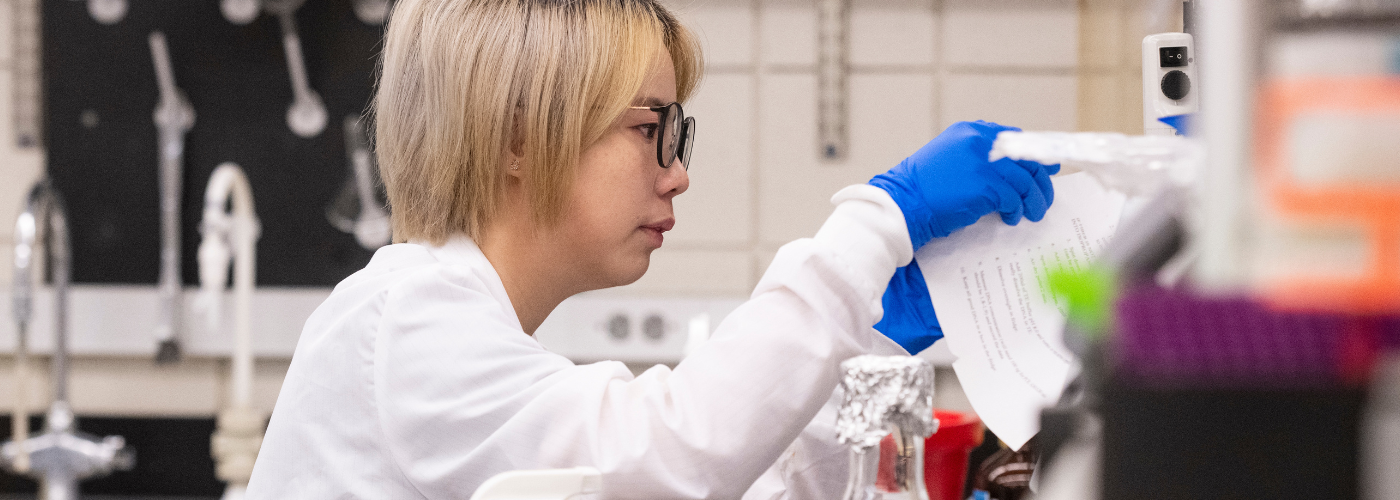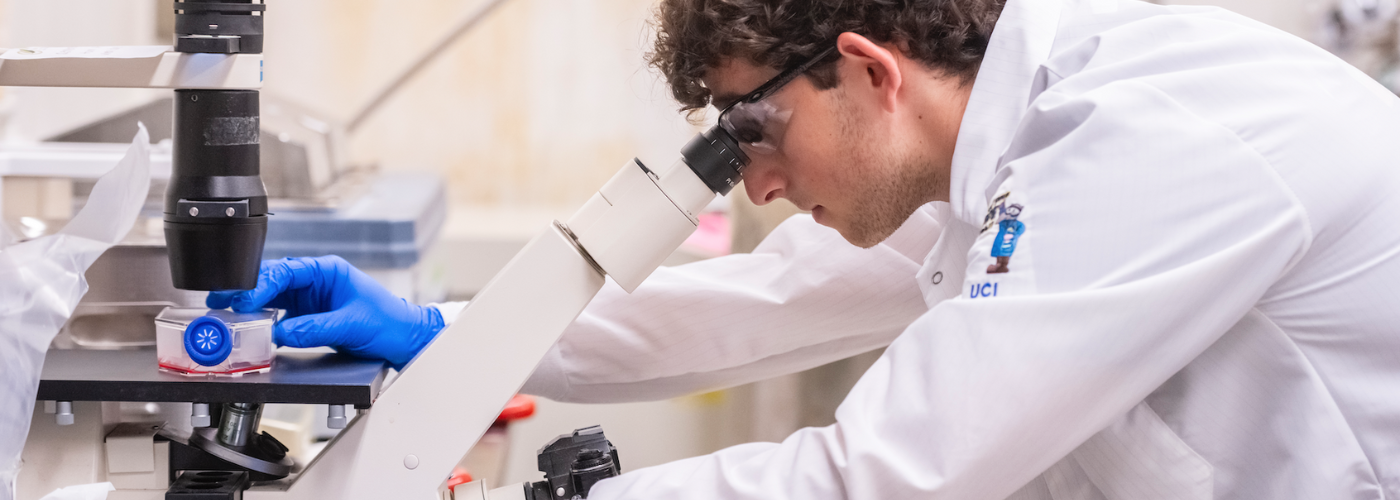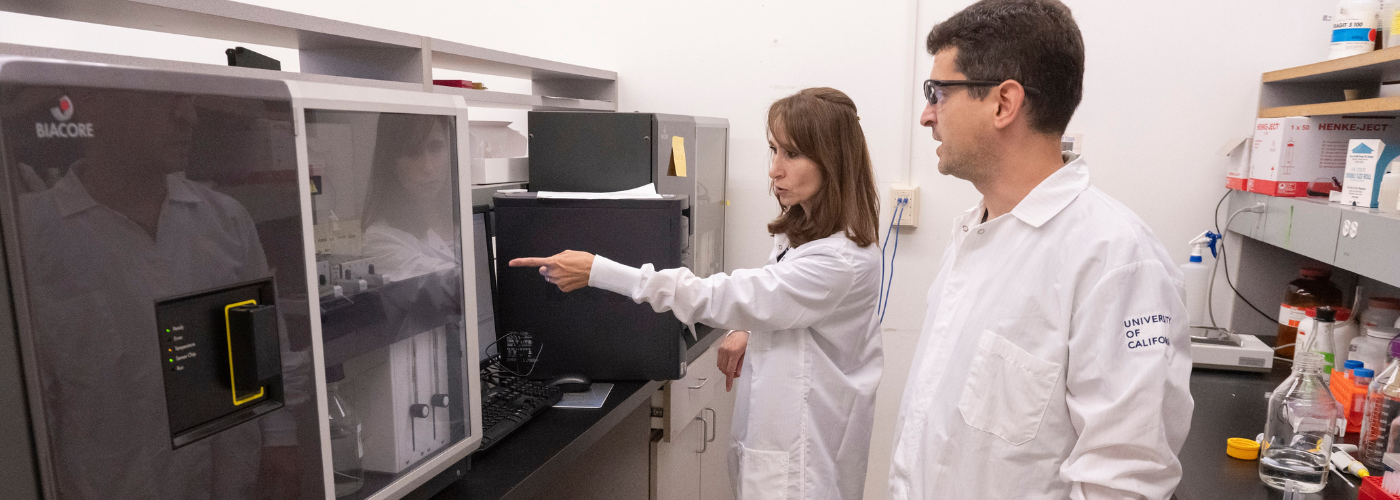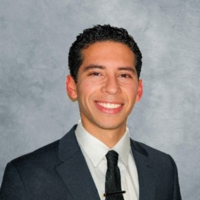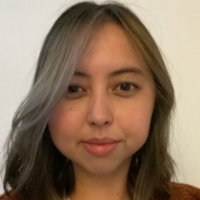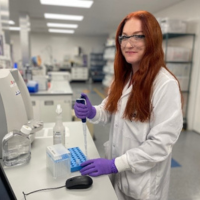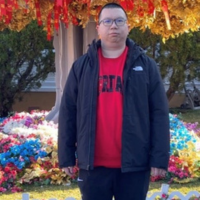Fall 2024 Admission Deadline: June 14, 2024
Master of Science in Pharmacology
The University of California, Irvine’s Master of Science in Pharmacology (MSP) program is a two-year, 100% online degree program that equips students with advanced scientific literacy and a robust foundation in pharmacology, drug discovery and development processes, and experimental data analysis.
This program is best suited for working professionals in the pharmaceutical industry and related fields who are seeking an advanced degree while working full-time.
A Master of Science in Pharmacology can pave the path for a career in pharmaceutical research and development (R&D), regulatory affairs, clinical research, or academia.
Who Should Enroll?
This program is designed for working professionals who are interested in advancing in their careers or enhancing their competitiveness for admission to other degree programs, including PhD, PharmD, MD, and more.
The online format of the MSP program allows for greater flexibility and ease of attendance, regardless of geographical location.
Program Benefits
Students will leave this program with the necessary skills and tools to advance their career in pharmaceutical or biotechnology companies, in the academic environment, in undergraduate education, or in government agencies.
With a Master of Science in Pharmacology, you can work for research institutes, governmental institutions, and private biotechnology or pharma companies, among others. Additional related jobs include biomedical scientist, clinical research associate, clinical trial associate, academic researcher, etc.
Our program offers students the opportunity to network with and learn from top industry professionals from leading pharmaceutical companies, including Johnson & Johnson, Allergan, AbbVie, and Pfizer.
Our alumni have reported that earning their Master of Science in Pharmacology was essential to future career successes, including pay increases and promotions, as well as acceptance to advanced degree programs.
Learning Outcomes:
- Understand experimental techniques and model systems used in pharmacological research
- Develop experimental design and data analysis techniques
- Learn critical steps involved in the discovery and optimization of new drugs
- Explore current hot topics in the field of pharmacology
- Network with peers and other industry professionals
- Gain an understanding of ethical conduct in research, including data handling, authorship, conflicts of interest, animal rights, and handling of misconduct
Students will also gain the following core skills:
- An understanding of techniques and principles of the science of pharmacology
- Scientific literacy
- Critical thinking
- Research skills
- Method development
- Analytical skills
- Data analysis and interpretation
Application Process
Admissions Requirements
- A bachelor’s degree from a recognized academic institution
- A minimum cumulative undergraduate GPA of 3.0
- Official transcript(s)
- A minimum of two years of undergraduate coursework related to biology and/or chemistry
- A minimum of one year of laboratory experience (e.g., employment, research, coursework)
- Personal statement addressing motivation and suitability for the program
- Three letters of recommendation
- English Language Proficiency: All graduate applicants, except those who have earned an undergraduate or master’s degree from an institution at which English was the sole language of instruction according to the World Higher Education Database, are required to demonstrate English proficiency for admissions consideration. If English is not the sole language of instruction listed or if no language is listed at all, the waiver does not apply and the applicant is required to take and pass an approved English proficiency test (TOEFL or IELTS).
- TOEFL (minimum score of 80)
- IELTS (minimum overall score of 7)
Note: the GRE exam is not required.
Application Process
Students are admitted to the MSP program on an annual basis for the Fall quarter. In depth information on the UCI application process can be found at http://www.grad.uci.edu/admissions/.
Step 1
Complete and submit your Application for Admission online. The application is found on the Graduate Division/UC Irvine web page Online application for graduate admissions. Under the degree section, select the Master of Science in Pharmacology option.
Note that the Statement of Purpose is part of the online application. This statement should demonstrate your writing ability and clarity of thought. It should include a personal history describing your professional and academic achievements, and in particular, your laboratory and research experience. You should provide a statement of purpose, detailing current goals, and specifically how and why the MSP program will help you achieve them. You also should indicate your understanding of the challenges of online learning and articulate your readiness to benefit from this type of instructional modality.
If you have any technical difficulties submitting your application, email gradapplicant@uci.edu or call (949) 824-6363.
Step 2
Pay fees. Once you have finalized your application in full, press the submit button which then prompts you to pay the appropriate application fee using Visa or MasterCard.
Nonrefundable application fees:
US citizens and lawful US permanent residents: $135
All other applicants, including international students: $155
Step 3
Provide Letter of Recommendation and Waiver of Access forms (available via the online application system) to the three people you have identified who can evaluate your academic and/or professional achievement, describe your strengths and weaknesses, and comment on our character, integrity and motivation. Letters that speak to your ability to perform in a post-graduate academic program are especially useful. All letters must be submitted online.
Step 4
Upload all transcripts to your application. Ensure the scanned copies are legible before uploading. Do not mail official transcripts to the department. If you are admitted, you will be asked to mail official transcripts to the Graduate Division at that time.
Step 5
International students must submit the results of their TOEFL exam. Scores will be sent directly to UC Irvine by the testing agency. Please choose Institution Code 4859.
NOTE: All supplemental materials must arrive before or on the application deadline in order for the application to be deemed complete and reviewed. You must supply a valid e-mail address that you will maintain at least 8 months after you apply. Students will be notified via this email address when they have been accepted into the program.
Program Fees
To view the current tuition and fees, visit the University Registrar webpage. UC Irvine bills for fees each quarter.
This is a different fee structure than other UC programs due to the unique nature of the program and its associated technology costs
Currently, there is no additional charge for out-of-state or international students
You are expected to take and complete two online courses each quarter during Fall (September-December), Winter (January-March), and Spring (March-June).
NOTE: This program is a self-supporting degree program and not supported with state funds, thus certain fee waivers traditionally accepted by the University of California may, or may not, be accepted. For example, the MSP program is not subject to the state law regarding Cal/Vet tuition/fee exemptions, and students enrolling in this program cannot use Cal/Vet tuition/fee exemptions.
Financial Aid
Master’s students are typically self-supported. Because the MSP program is a fully accredited graduate degree, enrolled students from the U.S. (citizens and eligible non-citizens) are eligible to apply for specific federal loan programs:
- Federal Direct Unsubsidized Stafford Loan
- Federal Direct Graduate PLUS Loan
To be considered, all domestic (e.g., non-foreign) graduate students must complete the Free Application for Federal Student Aid (FAFSA).
Please note that foreign students are not eligible for financial aid. Therefore, foreign students should not complete a FAFSA. For further information, please check the UCI Financial Aid office website.
Schedule of Classes & Curriculum
The MSP degree program requires 39 units of coursework, including 3 units of a capstone project. All courses in the program are required.
I view the UCI Master of Pharmacology program as a major stepping stone in my career toward earning a PhD. I have achieved mastery of various principles and aspects of pharmacology. From systemic pharmacology to drug discovery, the MSP program provides comprehensive, in-depth knowledge for pharmacology research. The MSP curriculum also offers practical skills in data analysis, experimental design, and research ethics.
Brianna Doan, UCI Master of Science in Pharmacology Alumna
What is Pharmacology?
Pharmacology is defined as “the study and knowledge of drugs.”
It is the science of how drugs act within biological systems and how the body responds to drugs. The study of pharmacology encompasses the chemical properties, biological effects, and therapeutic uses of drugs.
Pharmacologists research and develop new medicines, improve our understanding of how medicines work, make sure medicines are used effectively and safely for everyone, and contribute to the development of new drug therapies and the understanding of disease mechanisms.
The study of pharmacology offers unique opportunities to contribute to the knowledge, well-being, and survival of mankind.
By providing advanced training in pharmacology, UCI’s MSP program prepares students for positions of leadership and responsibility in academic, industrial, and government settings.
I highly appreciate the UCI Master of Pharmacology program being offered online. I had contemplated pursuing a master’s degree before but attending classes while managing a full-time job had been a major deterrent. From my perspective, someone that has been in the industry for several years focused on the technical aspects of research, I consider this program a great stepping stone for advancing a career in research and other life science-related disciplines.
Dora Santos, UCI Master of Science in Pharmacology Alumna
Our Faculty
Olivier Civelli, PhD
Olivier Civelli, PhD
Chair and Professor of Pharmacology; Eric L. and Lila D. Nelson Endowed Chair in Neuropharmacology
Dr. Civelli is currently serving as MSP Program Director and has responsibility for oversight and general administration of the program. Dr. Civelli is a recognized leader in the field of neuropsychopharmacology. He was the first to clone the D2 dopamine receptor and discovered the diversity of the dopamine receptors, in particular the D4 receptor. He spearheaded reverse pharmacology and used it to discover the first new neuropeptide identified by this approach, nociceptin/orphanin FQ and later neuropeptide S. He discovered the receptors for melanin concentrating hormone and for urotensin II. His primary interest is the study of neuropsychiatric disorders, in particular schizophrenia. Dr. Civelli is well versed in the area of pharmaceutical drug discovery. Earlier in his career, he was a vice president at F. Hoffmann-La Roche, Basel and was head of one of the company’s preclinical research departments. He also started a biotechnology company. Dr. Civelli has authored more than 200 manuscripts and holds 30 patents.
Amal Alachkar, PhD
Amal Alachkar, PhD
Professor of Pharmacology and Neuroscience
Dr. Alachkar was trained as a pharmacist and received her Ph.D. in Neuroscience from the University of Manchester, UK. She has extensive background in molecular and behavioral neuroscience and neuropharmacology. Dr. Alachkar established the first neuroscience laboratory in Syria in the School of Pharmacy at the University of Aleppo before moving to the US. Her research focuses on associations between genetic and environmental factors and mental disorders such as schizophrenia, autism and depression. Dr. Alachkar is investigating potential therapies using an epigenetic model of schizophrenia that involves methionine exposure during gestation. She has discovered that melanin concentrating hormone receptor knock out (MCHR1 KO) female mice display maternal deficits and is studying this model to develop the potential therapeutic use of MCHR1 antagonists for the treatment of postpartum depression in humans.
Frederick J. Ehlert, PhD
Frederick J. Ehlert, PhD
Professor of Pharmacology
Dr. Ehlert is internationally known for his development of computational methods to analyze drug interactions with G protein-coupled receptors (GPCRs). He recently published the book Affinity and Efficacy, the Components of Drug-Receptor Interaction. Dr. Ehlert’s analytical methods provide a means for validating conclusions drawn from docking drug molecules onto active and inactive receptor structures in silico. His approach is useful for quantifying agonist signaling through different pathways (agonist bias) and allosteric modulation of pathway selectivity. Finally, his analysis provides a more useful interpretation of structure-activity relationships. Dr. Ehlert’s lab analyzes models of drug-receptor interactions using a variety of techniques: computer simulation of receptor events, cell culture, second messenger assays, and contractile measurements on isolated smooth muscle from wild type and receptor knockout mice. In particular, Dr. Ehlert has focused on muscarinic receptors and the development of novel subtype-selective irreversible antagonists. Dr. Ehlert received his Ph.D. in Pharmacology from UC Irvine. He serves on the editorial board of 3 major international journals and his industry ties include work with Pfizer, Inc.
Stephen Hanessian, PhD
Stephen Hanessian, PhD
Distinguished Professor
Stephen Hanessian holds the rank of Distinguished Professor in the UCI Department of Pharmaceutical Sciences. Combining bioorganic principles with medicinal chemistry objectives, Dr. Hanessian has made seminal “first to conceive and/or first to achieve” contributions in the design and synthesis of originally designed enzyme inhibitors, antibiotics, antiviral and anticancer agents, and the development of innovative drug delivery systems. Arguably one of the premier academic ambassadors to the pharmaceutical and biotech industries as a consultant and collaborator, Dr. Hanessian is a rare researcher who can engage effectively in numerous productive projects of mutual interest while simultaneously maintaining fully autonomous, high impact research programs in state-of-the-art areas of medicinal relevance. Dr. Hanessian has published nearly 600 original papers and holds over 50 patents.
Naoto Hoshi, MD, PhD
Naoto Hoshi, MD., PhD
Associate Professor of Pharmacology
Dr. Hoshi received his M.D. and Ph.D. from Kanazawa University School of Medicine, Japan. The Hoshi laboratory studies the function and regulation of the M-channel as a model system for understanding how low threshold voltage-gated channels contribute to higher brain functions such as learning and memory and also pathological states such as epilepsy. M-channel modulators have therapeutic potential for controlling pathological neuronal activity. Dr. Hoshi’s detailed analyses of the M-channel complex revealed that the KCNQ2 channel tethers several kinases and protein phosphatases as well as its direct binding to GPCRs. This receptor-ion channel complex is a fundamental regulatory mechanism, which is also important for the heart pacemaker channel, HCN4 channel. Dr. Hoshi recently discovered that the widely used anticonvulsant valproic acid acts by protecting the M-current from neuromodulators. Dr. Hoshi’s studies utilize molecular biology, electrophysiology, live cell FRET imaging and behavioral neuroscience.
Diana N. Krause, PhD
Diana N. Krause, PhD
Adjunct Professor of Pharmacology
Dr. Krause is recognized for her expertise on hormonal regulation of the cerebral circulation, in particular, the influence of estrogen and other sex steroid hormones on vasculature function and disorders such as stroke and headache. Her research group has made pioneering discoveries that give insight into why cerebrovascular physiology and pathology differ between males and females and over the course of the female lifespan, e.g., pre- vs. postmenopause. Dr. Krause is currently collaborating with investigators at the University of Lund, Sweden, on a promising novel treatment for stroke. She earned her Ph.D. in neuroscience from UCLA and has previous industry experience as Director of Pharmacology for Nelson Research (Irvine, CA). She currently is a consultant for the biotech company Edvince AB.
Larry Plon, PharmD
Larry Plon, PharmD
Adjunct Professor, Pharmaceutical Sciences
Dr. Larry Plon received his Doctor of Pharmacy degree from the University of Southern California and then a residency in Clinical Pharmacy at the University of California San Francisco School of Pharmacy. He then went to USC School of Pharmacy where he taught medicine and then psychiatry. Five years later, he came to UCI and established a Psychiatric Pharmacy Program. Over his thirty plus years at the Medical Center, he contributed to the Burn Unit, Geriatric Services, and helped expand the Clinical Trials service. He eventually became the Coordinator of Investigation Drug Services, Clinical Professor of Pharmacy, Clinical Professor of Psychiatry and Human Behavior and Associate Clinical Professor of Medicine. Prior to his retirement from the Medical Center, he was asked to develop and teach an undergraduate course in Pharmacotherapy for the new major of Pharmaceutical Sciences.
Qun-Yong Zhou, PhD
Qun-Yong Zhou, PhD
Professor of Pharmacology
Dr. Zhou has pioneered the research of prokineticins, a family of novel regulatory peptides that regulate diverse biological processes including gastrointestinal motility, pain perception, tumorigenesis and circadian rhythm. His group has developed potent and selective small molecule prokineticin antagonists with potential as therapeutic drugs for significant human disorders such as cancer, cerebral ischemic stroke, and mood disorders. Multiple approaches are used to elucidate the regulation of prokineticin ligands and receptors, including molecular biology, genetics, electrophysiology, and behavioral pharmacology. Dr. Zhou received a Pharmacy degree from Shanghai Medical University and a Ph.D. in Molecular Biology from Oregon Health Sciences University. He is the scientific founder of the biotech firm Kinexis and collaborates with Merck & Co.
Industry Leader Guest Speakers
Current Students
Andres Staben
Field of study:
B.S. Biological Sciences
Current location:
Playa Del Rey, California, USA
Current work:
Kite Pharma: CAR-T Cell Therapy
Ivan Perez Garcilazo
Field of study:
Microbiology, Immunology, Molecular Genetics
Current location:
Long Beach, California, USA
Current work:
UCLA: Cancer Immunotherapy Research
Casey Wood
Field of study:
B.S. in Biopsychology
Current location:
San Diego, California, USA
Current work:
Abzena: Process Development of antibody drug conjugate intermediates
Andy Li
Field of study:
B.S. degree in Cellular Developmental Biology from UC Santa Barbara
Current location:
Los Angeles, California, USA
Robby Jones
Field of study:
B.S. Biochemistry and Molecular Biology
Minor in Biophysics
Current location:
Santa Ana, California, USA
Current work:
AbbVie, immunology lab
